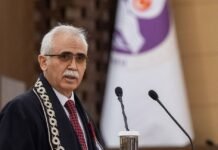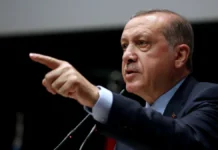Turkey will not respect the Council of Europe if it does not respect Turkish courts, President Recep Tayyip Erdoğan said on Thursday, when asked about a decision to refer the case against philanthropist Osman Kavala back to a top European court, Turkish Minute reported, citing Reuters.
Kavala, one of Turkey’s highest-profile detainees, has been held for more than four years without a conviction.
The European Court of Human Rights (ECtHR) ruled more than two years ago that Kavala should be released immediately and said his detention served to silence him, but Turkey has not carried out the ruling.
The council said on Thursday that its committee had referred the case to the ECtHR to determine whether Turkey has failed to meet its obligation to implement the court’s judgment in line with the European Convention on Human Rights.
The referral to the ECtHR is the next step in “infringement proceedings” that could result in Turkey’s suspension from the Council of Europe, of which it is a founding member.
“The Committee found that, by failing to ensure Mr Kavala’s immediate release, Turkey is refusing to abide by the Court’s final judgment in his case,” it said in a statement.
At a news conference, Erdoğan said Turkey will not recognize those who do not recognize its courts.
“What the ECtHR has said, what the Council of Europe says, this doesn’t concern us much because we expect our courts to be respected,” he said.
“To those who don’t show this respect: excuse us, but we will have no respect for them either,” Erdoğan added.
The foreign ministry said on Wednesday Turkey had carried out the ECtHR ruling and that Kavala was detained for a different judicial proceeding.
Kavala was acquitted in 2020 of charges related to 2013 nationwide protests. Hours later, another court ordered his arrest based on a charge of attempting to overthrow the constitutional order related to the 2016 coup attempt, which the ECtHR had also said lacked basis.
That court later ruled to release him on that charge but ordered his detention on an espionage charge in the same case, a move critics said was aimed at circumventing the ECtHR ruling.















